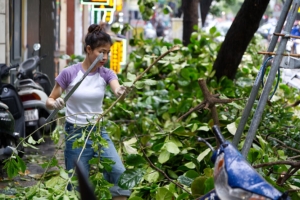How International Aid Is Helping the Victims of Typhoon Yagi
 Typhoon Yagi emerged over the South China Sea in early September 2024, before making landfall in several Southeast Asian countries. Described by international organizations as one of the strongest storms in decades, it has caused heavy rainfall and widespread flooding, resulting in extensive physical damage and a total death toll of more than 500. Alongside the efforts of national governments to help their citizens affected by the damage, millions of dollars in international aid for Typhoon Yagi victims have also been provided by institutions such as the European Union (EU), the World Health Organization (WHO) and the United Nations Children’s Fund (UNICEF).
Typhoon Yagi emerged over the South China Sea in early September 2024, before making landfall in several Southeast Asian countries. Described by international organizations as one of the strongest storms in decades, it has caused heavy rainfall and widespread flooding, resulting in extensive physical damage and a total death toll of more than 500. Alongside the efforts of national governments to help their citizens affected by the damage, millions of dollars in international aid for Typhoon Yagi victims have also been provided by institutions such as the European Union (EU), the World Health Organization (WHO) and the United Nations Children’s Fund (UNICEF).
Aid in Vietnam
Vietnam has been one of the nations most severely affected by Typhoon Yagi, with more than 300 deaths being recorded and more than 50,000 people being forced to evacuate their homes. As a result, international aid for Typhoon Yagi has focused on Vietnamese reconstruction. The U.K. government has given more than $1 million to the country. In contrast, the EU has given about $720,000 of the $2.4 million total promised to Southeast Asia. These have helped supply emergency resources such as food and health care items.
Alongside government aid, Vietnam has also received water sanitizing resources from UNICEF, as widespread flooding has limited the supply of clean water and left 400,000 households in the country without access to it. UNICEF has provided 80,000 water purification tablets and 4,000 liters of clean water to the country’s three worst-hit provinces, alongside other health care items such as hand sanitizers and soap. With many schools damaged or destroyed in the flooding, along with the roads and bridges leading to them, UNICEF has supplied temporary learning materials for children who have lost access to education.
Similarly, the WHO has also supplied one million water purification tablets and 500 water containers to the Vietnamese Ministry of Health. It has also worked alongside the U.S. Agency for International Development (USAID) to broadcast radio messages in several ethnic minority languages in order to ensure that various communities receive relevant safety information.
Political Difficulties in Myanmar
Myanmar, further West in the region, has also suffered severe damage as a result of the storm, affecting an estimated 630,000 people and killing more than 200. Heavy rainfall has caused flooding and mudslides, which in turn have damaged and blocked many of the nation’s roads and bridges. Furthermore, the civil war that has gripped the country since 2021 has made it difficult to assess the damage caused in rebel-controlled regions, as their communication with central military powers is limited.
As a result of such difficulties, the EU has dedicated the largest share of its aid to nations affected by Typhoon Yagi, while the U.N. World Food Programme (WFP) dedicated emergency food supplies to around 500,000 people affected by flooding in Myanmar. However, some difficulties remain for aid agencies trying to access rebel-controlled areas, both due to political instability and the damage caused to roads and bridges by excessive flooding.
Funding for Other Nations
International aid for Typhoon Yagi victims has also been provided to nations that sustained slightly less damage due to flooding. The EU allocated more than $200,000 to the Philippines and about $166,000 to Laos, while the WFP has distributed shipments of rice in some of the worst affected regions of Laos in order to aid those whose land and crops were damaged due to flooding.
Final Note
Typhoon Yagi has caused destruction across Southeast Asia, severely damaging infrastructure and leaving hundreds of thousands in precarious positions. Through providing clean water, health care and educational supplies, these organizations have demonstrated the importance of international aid in providing relief to those affected by natural disasters and helping nations recover from widespread damage. International aid for Typhoon Yagi victims, from both governments and NGOs, has proved key in providing stability and security for regions impacted by widespread flooding.
– Izzy Tompkins
Izzy Tompkins is based in Leeds, UK and focuses on Global Health and Politics for The Borgen Project.
Photo: Wikimedia Commons
